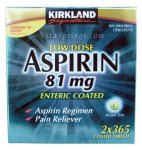Low-dose aspirin therapy — the daily 75 mg aspirin which was commonly recommended to reduce heart disease some years ago, but since found less useful for that purpose unless disease is already present — has been found to greatly reduce the rare but almost always fatal pancreatic cancer, which killed at least two of my friends (so far.)
A study out of Yale (Samantha A. Streicher, Herbert Yu, Lingeng Lu, Mark S. Kidd, and Harvey A. Risch. Case–Control Study of Aspirin Use and Risk of Pancreatic Cancer. Cancer Epidemiology, Biomarkers & Prevention, June 2014 DOI: 10.1158/1055-9965.EPI-13-1284) reports convincing evidence of the protective effect:
Men and women who took low-dose aspirin regularly had 48 percent reduction in their risk for developing pancreatic cancer. Protection against pancreatic cancer ranged from 39 percent reduction in risk for those who took low-dose aspirin for six years or less, to 60 percent reduction in risk for those who took low-dose aspirin for more than 10 years.
“Older studies of aspirin use have been clouded by the use of [regular- or high-dose] aspirin for pain relief from conditions that themselves might be related to the risk for pancreatic cancer. Only recently have people been using low-dose aspirin for long enough times [to prevent cardiovascular disease] that the use might bear on risk of pancreatic cancer development,” explained Risch.
“There seems to be enough evidence that people who are considering aspirin use to reduce the risk for cardiovascular disease can feel positive that their use might also lower their risk for pancreatic cancer, and quite certainly wouldn’t raise it,” Risch added.
Study subjects were recruited from the 30 general hospitals in Connecticut between 2005 and 2009. There were 362 pancreatic cancer cases and 690 controls. Study subjects were interviewed in person to determine when they started using aspirin, the number of years they used aspirin, the type of aspirin they used (low versus regular dose), and when they stopped using aspirin, among other things. Confounding factors, including body mass index, smoking history, and history of diabetes, were taken into account.
Of the study participants, 57 percent were men, about 92 percent were non-Hispanic white, about 49 percent were former or current smokers, and 19 percent had been diagnosed with diabetes within the three years prior to this study.
A dose of 75 to 325 mg of aspirin per day was considered as low-dose aspirin (usually taken for heart-disease prevention), and a dose higher than that, generally taken every four to six hours, was considered as regular-dose aspirin taken for pain or anti-inflammation purposes.
Of the participants, 96 percent of low-dose aspirin users and 92 percent of regular-dose aspirin users reported daily aspirin use.
The earlier a person started regularly taking low-dose aspirin, the greater the pancreatic cancer risk reduction, ranging from 48 percent reduction in those who started three years before the study, to 60 percent in those who started taking it 20 years before the study. On the other hand, discontinuation of aspirin use within two years prior to the study was associated with a threefold increased risk for pancreatic cancer compared with continuing use.
As usual, this study proves an association but not causality: it may be that those people who followed a low-dose aspirin regimen had other health habits that were protective. But absent a true controlled study of long-term use, this will have to do.
Low-dose aspirin (75 mg/day) also is associated with reductions in bowel cancers and probably other cancers, while side-effects may include increased bleeding. But it appears on the whole beneficial for older people generally, especially if they have early-stage heart disease.
Getting to Less Than 10% Body Fat Like the Models – Ask Me How!
Daily Aspirin Regimen Reduces Cancer Rates
Almonds: Superfood, Eat Them Daily for Heart Health
Fish Oil Supplements Ward Off Dementia
Lower Back Pain: Acetaminophen (Tylenol, Paracetamol) Useless
Cleanses and Detox Diets: Quackery
Gluten-Free Diets: The Nocebo Effect
Scams: Multi-Level Marketing, Herbalife
Fish and Fish Oil for Better Brain Health
Vitamin D: Anti-Dementia?
Salt: New Research Says Too Little May Be Unhealthy

11 comments